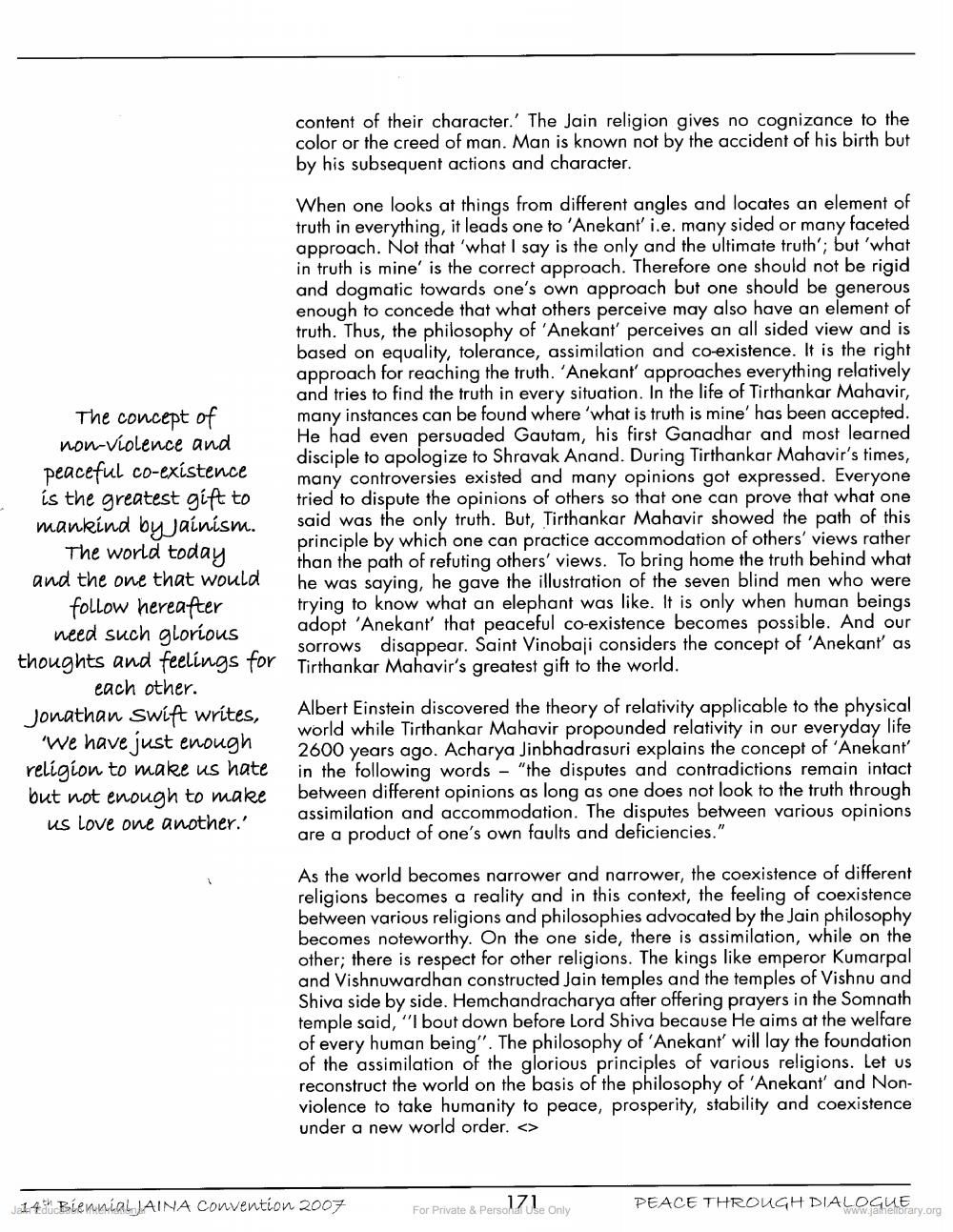________________
content of their character.' The Jain religion gives no cognizance to the color or the creed of man. Man is known not by the accident of his birth but by his subsequent actions and character.
The concept of non-violence and peaceful co-existence is the greatest gift to mankind by Jainism.
The world today and the one that would
follow hereafter
need such glorious thoughts and feelings for
each other. Jonathan Swift writes,
'We have just enough religion to make us hate but not enough to make
us love one another.'
When one looks at things from different angles and locates an element of truth in everything, it leads one to 'Anekant' i.e. many sided or many faceted approach. Not that 'what I say is the only and the ultimate truth'; but what in truth is mine' is the correct approach. Therefore one should not be rigid and dogmatic towards one's own approach but one should be generous enough to concede that what others perceive may also have an element of truth. Thus, the philosophy of 'Anekant' perceives an all sided view and is based on equality, tolerance, assimilation and coexistence. It is the right approach for reaching the truth. 'Anekant' approaches everything relatively and tries to find the truth in every situation. In the life of Tirthankar Mahavir, many instances can be found where 'what is truth is mine' has been accepted. He had even persuaded Gautam, his first Ganadhar and most learned disciple to apologize to Shravak Anand. During Tirthankar Mahavir's times, many controversies existed and many opinions got expressed. Everyone tried to dispute the opinions of others so that one can prove that what one said was the only truth. But, Tirthankar Mahavir showed the path of this principle by which one can practice accommodation of others' views rather than the path of refuting others' views. To bring home the truth behind what he was saying, he gave the illustration of the seven blind men who were trying to know what an elephant was like. It is only when human beings adopt 'Anekant that peaceful co-existence becomes possible. And our sorrows disappear. Saint Vinobaji considers the concept of 'Anekant' as Tirthankar Mahavir's greatest gift to the world.
Albert Einstein discovered the theory Albert Einstein discovered the theory of relativity applicable to the physical world while Tirthankar Mahavir propounded relativity in our everyday life 2600 years ago. Acharya Jinbhadrasuri explains the concept of 'Anekant' in the following words - "the disputes and contradictions remain intact between different opinions as long as one does not look to the truth through assimilation and accommodation. The disputes between various opinions are a product of one's own faults and deficiencies."
As the world becomes narrower and narrower, the coexistence of different religions becomes a reality and in this context, the feeling of coexistence between various religions and philosophies advocated by the Jain philosophy becomes noteworthy. On the one side, there is assimilation, while on the other; there is respect for other religions. The kings like emperor Kumarpal and Vishnuwardhan constructed Jain temples and the temples of Vishnu and Shiva side by side. Hemchandracharya after offering prayers in the Somnath temple said, "I bout down before Lord Shiva because He aims at the welfare of every human being". The philosophy of 'Anekant' will lay the foundation of the assimilation of the glorious principles of various religions. Let us reconstruct the world on the basis of the philosophy of 'Anekant' and Nonviolence to take humanity to peace, prosperity, stability and coexistence under a new world order. <>
J14 Biennial AINA Convention 2007
171. Only
For Private & Personal use only
PEACE THROUGH DIALOGUE




